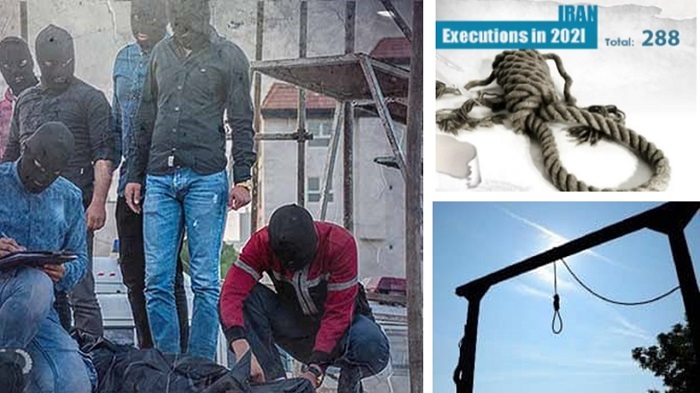
With at least 16 executions carried out in Iran just in the second week of October alone, and with barely two months left until 2021 draws to a close, the Iranian regime has already overtaken the number of executions that took place the previous year.
In figures reported by the Iran Human Rights Monitor, the total number of executions carried out in 2020 was 255, whereas the numbers so far for 2021 stand at 288 as of Monday, October 18. Currently, Iran has the highest annual rate of executions per capita, a status they have maintained for a while under the control of the mullahs’ regime.
The National Council of Resistance of Iran (NCRI) said, “Iran is also one of only a few countries in the world to routinely issue death sentences for persons who were under the age of 18 at the time of their alleged crimes. This practice is unequivocally banned under international law, as is the use of the death penalty.”
Regime officials openly acknowledge this fact, blatantly flouting international human rights standards and laws. In other unlawful acts, the regime’s security forces often secure confessions under torture, and murder charges are often used as a pretence for the politically motived executions that take place across Iran.
The latter practice was used in the case of Navid Afkari, a national champion wrestler accused of killing a security guard during an anti-regime protest. Despite an international campaign to save his life, Afkari was executed in September 2020. Only later did it come to light that there was surveillance footage that proved his innocence.
At the time of Afkari’s execution, Ebrahim Raisi was positioned as the head of the judiciary. During his tenure, Raisi oversaw the severe crackdown of the nationwide uprising that took place in November 2019, during which 1,500 protesters were brutally killed by regime security forces, while thousands of others were arrested and tortured.
The NCRI said, “Earlier this year, Raisi was selected as the regime’s new president, sparking new protests over his role in the crackdown as well as his longstanding legacy as a violator of human rights and one of the regime’s foremost advocates for capital punishment, other forms of corporal punishment, and the violent suppression of dissent.”
During the summer of 1988, Raisi was recruited as an official on the Tehran ‘death commission’, and was tasked with implementing a fatwa issued by then-Supreme Leader Ruhollah Khomeini which called for the executions of supporters of the People’s Mojahedin Organization of Iran (PMOI/MEK). By the end of that summer, over 30,000 political prisoners lost their lives for refusing to denounce their support of the Resistance group.
The NCRI said, “His crackdown on dissent in 2019 and the ongoing acceleration of Iran’s execution rate both suggest that this process is well underway, and this in turn fuels calls for the international community to take meaningful action in support of human rights.”
A number of Iranian expatriates held a series of rallies in Stockholm on Monday to bring more international attention to the 1988 massacre and call for the perpetrators to be prosecuted for their crimes against humanity. The protests took place at the same time as the latest session in the Swedish criminal court of the trial of Hamid Noury. The former Iranian prison official was arrested as he entered Sweden in 2019, on the principle of universal jurisdiction, for his involvement in the massacre.
The NCRI said, “The same principle could be applied to Ebrahim Raisi, who should be barred from traveling to any Western nation, or else arrested after he does so. Earlier in October, former Member of the European Parliament Struan Stevenson issued a formal request for this arrest to Police Scotland when it appeared as if Raisi might travel to Glasgow for the COP26 climate change conference.”